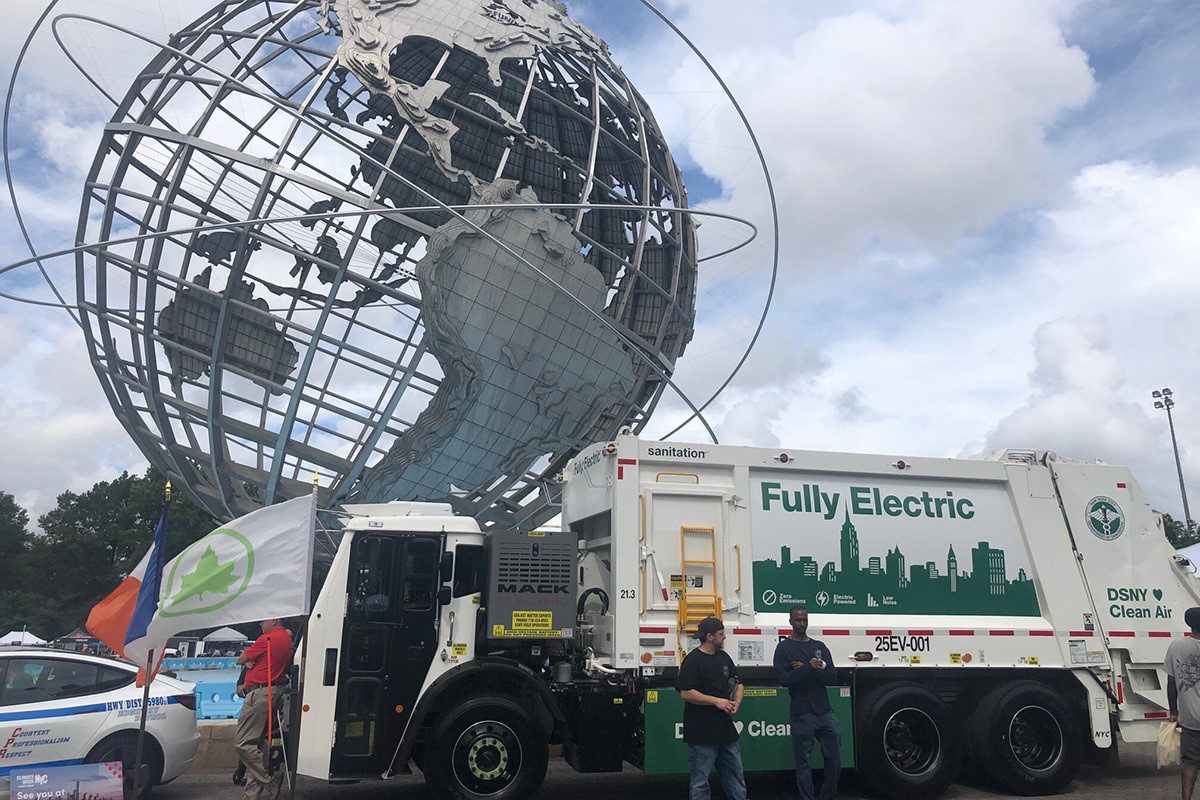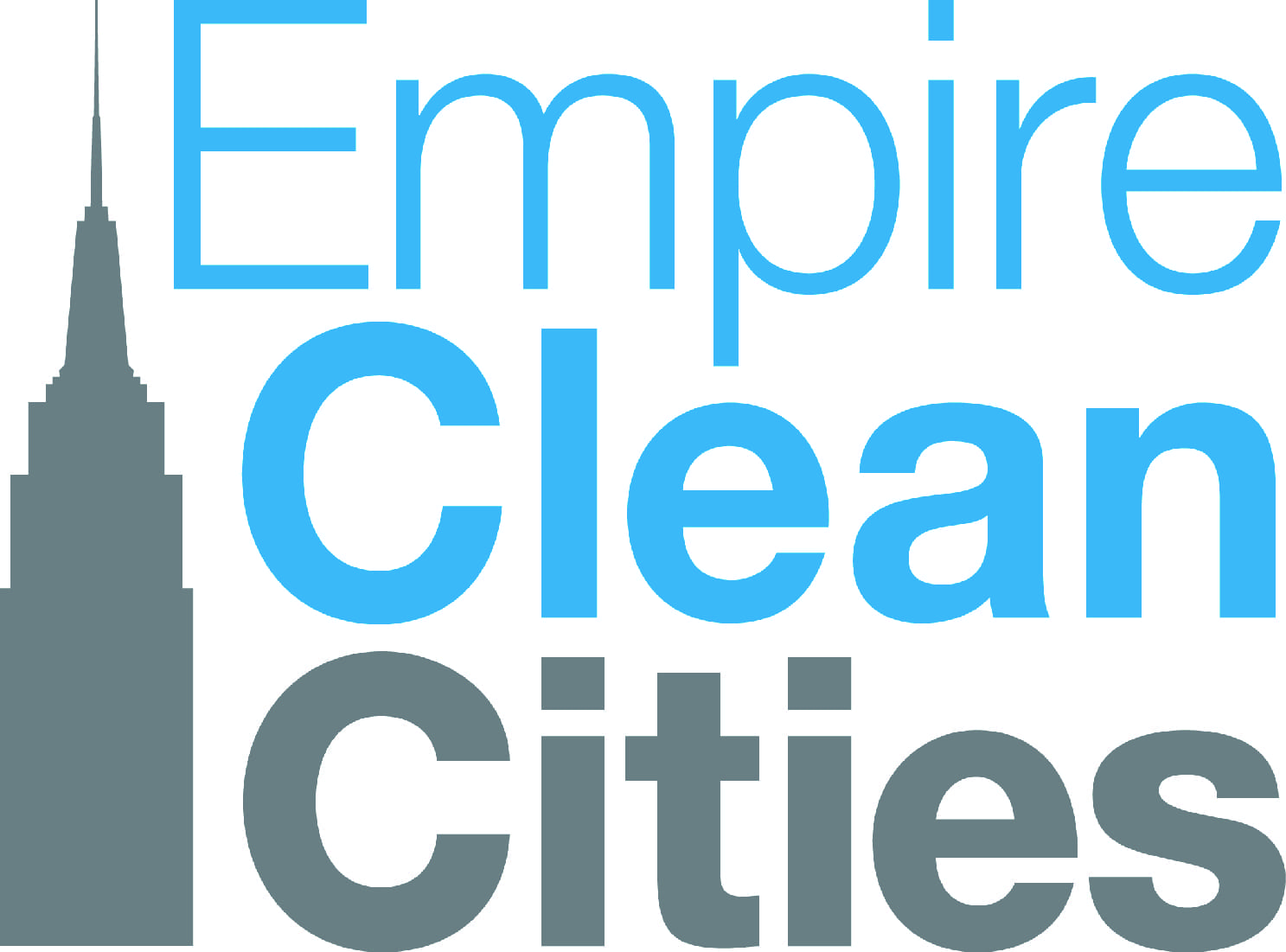Last month in NYC, alternative fuel, EV, and charging station suppliers convened around Queens’ iconic Unisphere for NYC’s 32nd Annual Equipment and Vehicle Show. More than 150 different exhibitors showed up to display their latest technologies, network with other groups and manufacturers, and discuss the latest and greatest in clean transportation.
The road surrounding the Unisphere was packed with leaders from across the industry, showing off their cutting-edge tech. Rideshare startup Revel featured one of its vehicles, a sky-blue Tesla Model Y. Manhattan Beer Distributors showed off its Class 8 Volvo VNR electric truck. A bright-yellow electric Class C school bus from Unique Electric Solutions (UES) was parked next to Biobus, a Brooklyn non-profit focused on youth science education, showing off its retrofitted school bus full of science activities for attendees.
NYC’s 32nd Annual Equipment and Vehicle Show had more than 150 exhibitors displaying the latest in clean transportation.
NYC’s Department of Citywide Administrative Services (DCAS), the event host, displayed a full bevy of electrified vehicles: an NYPD Tesla Model 3 patrol car, a plug-in hybrid Ford F-450 chassis ambulance, a fully electrified Mack Trucks LR Electric sanitation truck, and more, all sparkling in the early fall sun. The clean-tech exhibition was a testament to the tremendous progress the City’s fleet has made in reducing emissions.
Empire Clean Cities’12th Annual Stakeholder Meeting kicked off the day’s event with speakers from several of the organizations in attendance. During the meeting, panelists shared their insights on financing medium- and heavy-duty vehicle purchases, and the state of charging infrastructure for truck fleets in the city. Attendees heard from DCAS Commissioner Lisette Camilo, she updated everyone on the DCAS fleet sustainability efforts. The Honorable Benoit Charette, Quebec’s Minister of Sustainable Development, Environment, and Fight Against Climate Change also spoke at the show, in partnership with Propulsion Quebec, a three-day event focused on sustainability.
Following the stakeholder meeting, DCAS Chief Fleet Officer and Deputy Commissioner Keith Kerman took to the podium — nestled between the City’s electric fleet vehicles — with a thrilling announcement: $75 million in new investments are being made to help the country’s greenest municipal vehicle fleet become even greener.
DCAS Deputy Commissioner Keith Kerman made the thrilling announcement about the $75 million investment in NYC’s fleet.
New and Continuing Efforts to Green NYC’s Fleet
The monumental $75 million in funding will go towards three key areas: acquiring new electric vehicles to replace fossil fuel-powered ones, retrofitting existing fossil fuel-powered vehicles with electric drivetrains, and installing new electric vehicle charging infrastructure. This approach of electrifying some preexisting vehicles alongside purchasing new EVs, as well as providing ample charging for EVs across the five boroughs, will help support the City’s goal of transitioning to an all-electric fleet by 2040.
With the new funding, a total of 300 new electric vehicles will be purchased to replace gas and diesel models, including three new electric buses. Additionally, 78 new electrified ambulances will be pressed into service. One such plug-in hybrid ambulance was present at the fleet show, flanked by other emergency vehicles with either all-electric or partially electrified powertrains.
On the charging front, a total of 275 fast vehicle chargers were promised — including street-side chargers — a boon for both the City’s quickly electrifying fleet, NYC-based rideshare drivers, and the private owners of the more than 15,000 EVs registered across the five boroughs. In addition to these new fast chargers, 20 portable vehicle chargers and 11 new solar charging carports will meet further charging demand with even more flexibility. DCAS promises that the 275 fast chargers will all come online within the next two years.
The $75 million will help support NYC’s goal of transitioning to an all-electric fleet by 2040.
Lastly, a portion of the new funding will be used to retrofit 125 existing diesel-powered trucks to electric power. Rack trucks, box vans, and other non-emergency vehicles will receive an EV refresh. This measure is a prudent one: by breathing new life into preexisting truck chassis, the City will save money on the still high upfront cost of purchasing new MDHD trucks, while also averting the waste implications of sending their old vehicles to the scrapyard.
Building a Greener Future for the Next Generation
The importance of these investments in emissions reduction technology was not lost on anyone in attendance. Mere weeks before the fleet show, Hurricane Ida made landfall in New York, choking some of the City’s key transportation arteries and tragically killing 18 New Yorkers and many others across the eastern seaboard.
“Climate change isn’t bearing down on us, it’s already here,” said Queens Borough President Donovan Richards, Jr. “Greener streets and electric vehicle investments are a tremendous step forward for a more environmentally just New York. For the future of our city, we must eliminate our reliance on fossil fuels, and I look forward to helping ensure Queens is at the forefront of our green revolution.”
NYC remains poised to lead the nation in the transition to zero-emission transportation solutions.
Mayor Bill de Blasio also commented on the importance of this new capital investment in ending NYC Fleet’s use of fossil fuels, stating that climate change “is an existential threat facing our city, our nation, and our world … you can count on New York City to lead the way when it comes to finding sustainable climate solutions, fighting back against global warming, and building a greener future for the next generation.”
In addition to the climate benefits of the electrification of NYC’s fleet, others pointed to more immediate public health benefits of the switch—including Ben Furnas, Director of the Mayor’s Office of Climate and Sustainability. The funding push “is a key example of the City’s commitment to end the age of fossil fuels, improve air quality and public health—especially in Environmental Justice communities most impacted by polluting tailpipe emissions,” Furnas said.
With courageous funding pushes, innovative design, and partnerships with industry leaders, New York City remains poised to lead the nation’s metropolises in a just transition to zero-emissions transportation. For more information, check out the City’s official press release and DCAS’s NYC Fleet homepage.



